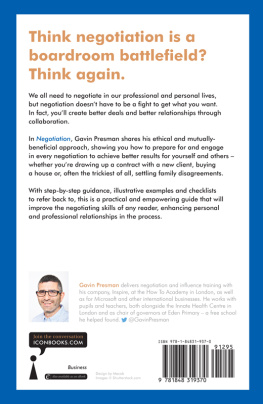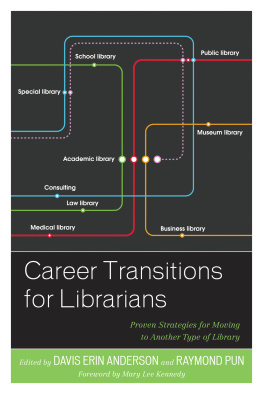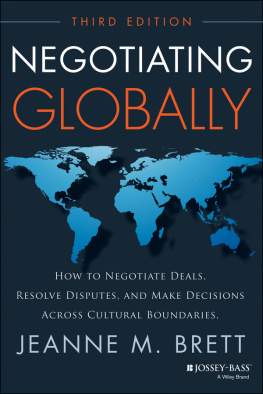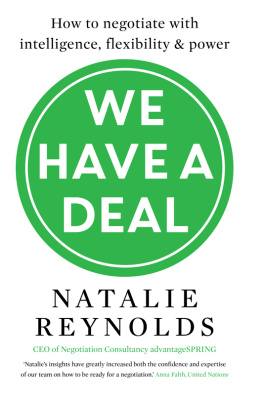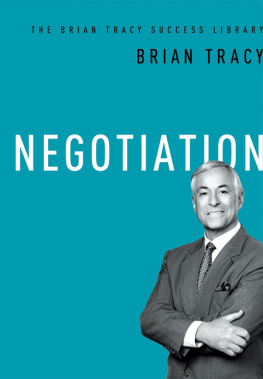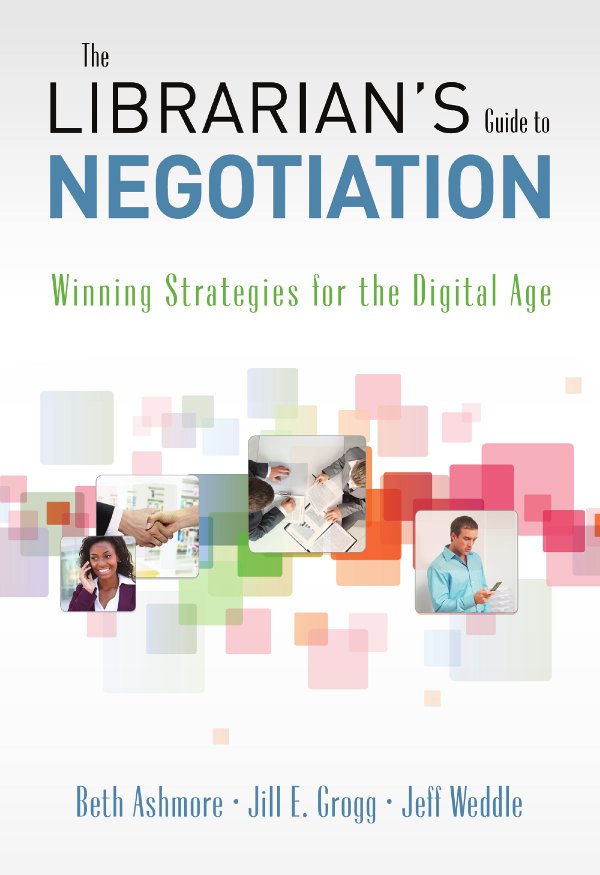
First Printing, 2012
The Librarians Guide to Negotiation: Winning Strategies for the Digital Age
Copyright 2012 by Beth Ashmore, Jill E. Grogg, and Jeff Weddle
All rights reserved. No part of this book may be reproduced in any form or by any electronic or mechanical means including information storage and retrieval systems without permission in writing from the publisher, except by a reviewer, who may quote brief passages in a review. Published by Information Today, Inc., 143 Old Marlton Pike, Medford, New Jersey 08055.
Publishers Note: The authors and publisher have taken care in preparation of this book but make no expressed or implied warranty of any kind and assume no responsibility for errors or omissions. No liability is assumed for incidental or consequential damages in connection with or arising out of the use of the information or programs contained herein.
Many of the designations used by manufacturers and sellers to distinguish their products are claimed as trademarks. Where those designations appear in this book and Information Today, Inc. was aware of a trademark claim, the designations have been printed with initial capital letters.
Library of Congress Cataloging-in-Publication Data
Ashmore, Beth, 1976
The librarians guide to negotiation : winning strategies for the digital age / Beth Ashmore, Jill E. Grogg, and Jeff Weddle.
pages cm.
Includes bibliographical references and index.
ISBN 978-1-57387-428-1
1. Acquisitions (Libraries) 2. Acquisition of electronic information resources. 3. Libraries and electronic publishing. 4. Library administration--Decision making. 5. Communication in library science. 6. Negotiation in business. I. Grogg, Jill E., 1972- II. Weddle, Jeff. III. Title.
Z689.A82 2012
021--dc23
2011049609
Printed and bound in the United States of America.
President and CEO: Thomas H. Hogan, Sr.
Editor-in-Chief and Publisher: John B. Bryans
VP Graphics and Production: M. Heide Dengler
Managing Editor: Amy M. Reeve
Project Editor: Barbara Quint
Editorial Assistant: Brandi Scardilli
Book Designer: Kara Mia Jalkowski
Cover Designer: Amy Romanofsky Schneider
Copyeditor: Bonnie Freeman
Proofreader: Barbara Brynko
Indexer: Candace Hyatt
www.infotoday.com
Taking the mystery out of negotiation is a pretty tall order, but that is exactly what The Librarians Guide to Negotiation achieves. Negotiation situations abound across the library profession involving multimillion dollar contracts with STM publishers, government funding for public libraries, and the evolution of the scholarly communication environment. These complex topics provide a few of the focal points for the discussion of negotiation throughout the guide, but also embedded are descriptions of essential skills required for effective negotiation, such as listening, preparation, and building context. Even if you are unaware of it, all of us use negotiation techniques throughout our daily lives.
Take my middle son, Christopher, for instance. Throughout his life hes participated in a series of negotiations to gain the upper hand with his older brother and to outwit his little sister. If you have interacted with eight-year-old boys, you are well aware of the variety of toys that are marketed to this age group: trading cards, transforming battle balls, puzzle erasers, fighting marbles, mini figures : The list goes on and on with new toy lines replacing each other before parents can even begin to figure them out.
My son, however, has an intuitive understanding of toy trends. He knows whats in and whats out. He collects the latest toy wonders as birthday and holidays gifts and then supplements them with his meager allowance. Once the fascination of a toy line begins to fade, its time to negotiate. He assesses his collection with serious intent, determines the trading value for these items and begins wheeling and dealing at school. As I prepare his book bag each day, Im constantly asking him, Where did you get this?, recognizing that I didnt buy the latest treasure tucked away in his bag. Oh, he says, I traded one of my Star Wars mini figures, but I only traded my duplicates. Even without steady financial resources he has figured out a way to acquire the latest craze while demonstrating many of the strategies threaded throughout the guide by Ashmore, Grogg and Weddle.
He definitely understands how to take advantage of tough economic times by evaluating what he really needs and giving up what is no longer important. His understanding of current toy trends and the needs of his friends (or customers) at school allow him to make winwin tradeshence, the perfect negotiation. Hes done his homework and kept his ear to the ground for trading opportunities.
Christopher serves as an analogy to many librarians: Hes enthusiastic, hes bright, hes tech-savvy, and he has no money. Librarians have waded through library school and entered the job market to find themselves in the midst of an information revolution. Technology and the explosion of electronic resources are quickly reshaping the role and potentially the value of the library for students and researchers This constant flux within the library environment makes it ripe for negotiation. With each negotiation, a librarian gains an opportunity to influence change. In my roles as project manager, supervisor, department head, author, and editor, my ability to negotiate has proved critical to my success.
Like my son, some librarians have an intuitive sense of how to negotiate. However, many lack awareness of how to influence others and shape the direction of their work despite possessing raw talent and superb technical skills. The Librarians Guide to Negotiation builds this awareness by detailing library-specific examples of negotiation across a spectrum of contexts. The authors detail interviews with experts who discuss tactics and best practices, and they also incorporate models and theory from nonlibrary-related literature throughout the guide. Awakening librarians to the importance of negotiation is the value proposition of this book. If librarians cultivate the skills described in this guide, just as I have seen in my son Christopher, mastering the art of negotiation will seem like childs play.
Maria Collins, head of content acquisitions
and licensing, North Carolina State University Libraries
Lets begin with two basic premises. First, for the practicing librarian in the 21st century, negotiation is a basic job function, and negotiation skills are a basic job requirement. Nowhere is that truer than in dealing with digital content and services. Some of the worst elements that initially appeared in digital license agreements, such as vendors unilaterally terminating access at the first hint of breach, may have become less common. Other unreasonable terms persist, however, requiring skilled and alert negotiation to eliminate them.
Moreover, negotiation is a skill needed by all librarians, not just the librarian charged with purchasing digital content and making it available. Negotiation exists in the library in many guises and cuts across all areas of service, both public and technical. Therefore, knowing how to negotiate successfully remains a valuable and necessary skill for any librarian.
The second premise underlying this books approach to negotiation is the recognition that, for most librarians, negotiation is scary. If you are reading this introduction, chances are you can identify with this statement. Why do so many of us find the prospect of negotiation intimidating? For starters, we dont think we are very good at it. There is an impression that negotiation is something for which one either has a natural proclivity or doesnt. For those of us who dont feel like natural negotiators, this leaves us out in the cold. Librarians receive very little (if any) formal negotiation training, perhaps only sink-or-swim, on-the-job training in negotiation tactics after negotiations have already begun. Library schools may not offer negotiation classes. Therefore, little opportunity exists for the average librarian to have the bargaining process demystified.


